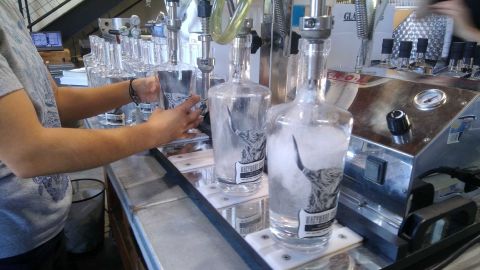The world loves cheese: last year, more than 21 million metric tons of it were produced globally. But to make cheese, you end up with a lot of whey, and that can be a problem.
Producing one pound of hard cheese creates nine pounds of whey — the liquid byproduct that’s left when milk is curdled and strained — and while large-scale cheesemakers often turn that into animal feed or whey protein, with small cheesemakers, much of it can go to waste.
Enter Wheyward Spirit. Its California distillery is taking leftover whey from local cheesemakers and turning it into an alcoholic spirit. It has just partnered with Ben & Jerry’s to replace the Irish cream liqueur in its Dublin Mudslide flavor — offering “the same taste with less waste,” according to the ice cream maker.
“Our big thing is to keep [whey] in the food system,” says Emily Darchuk, owner and founder of Wheyward Spirit.
Darchuk founded Wheyward Spirit in 2017 and spent several years developing its distillation process. Liquid whey is 95% water, but contains enough lactose sugar to ferment into alcohol. While this helps to save on water during distillation, it’s a more complex process than using conventional ingredients.

Since launching in September 2020, the artisanal spirit has been awarded a double-gold medal at the New York World Wine & Spirits Competition and a Good Food Award. Working with nearby small-scale cheesemakers, Wheyward says its two-person team has processed 500,000 pounds of whey that would otherwise have been wasted.
Containing 40% alcohol and retailing from $54.95 for a 750 ml bottle, it is priced for the premium market — but Darchuk says that consumers are curious to try the product and are on board with the zero-waste concept.
“People get the impact of it,” she says. “It’s that next movement in sustainable food.”
“A drop in the bucket”
Based on cheese production figures from the US Department of Agriculture, more than 100 billion pounds of liquid whey was produced in the United States in 2020. For most large-scale cheesemakers, this isn’t a problem, says Lisbeth Goddik, a food science professor at Oregon State University, with much of it converted into products like protein powders and animal feed.
“The challenge is that the smaller cheesemakers can’t afford to build these whey processing centers,” she tells CNN Business.
These smaller cheesemakers account for less than 1% of the market, by Goddik’s estimates, and their whey production is “a drop in the bucket” compared to bigger outfits. But they must pay for the whey to be treated before it is disposed of, which can be a significant additional expense, she says. Some supply the whey to local farmers to use as fertilizer, but if this isn’t well managed, it can pollute water sources.
“It matters a lot to the people at the small scale, and it certainly matters in the environment around them,” Goddik says. That’s where fermenting and distillation can be a useful innovation. “It’s less capital intensive than trying to process and dry the whey,” she explains.
Proving the market
Wheyward isn’t the only company transforming whey into alcohol: Bertha’s Revenge Irish Milk Gin and French vodka producer Lactalium Velvet both use whey as the main ingredient for their base spirit.
Distillation could be especially useful for acid whey, the byproduct of Greek yogurt. For every pound of yogurt, three to four pounds of acid whey are produced, which unlike sweet cheese whey, cannot be used in protein powders. Goddik has researched fermenting and distilling acid whey and says it “performed very well.”

Creating a high-value secondary market for whey could help the dairy industry, says Samuel Alcaine, a food scientist at Cornell University. His startup Norwhey makes an alcoholic seltzer from acid whey, which he says retains a lot of its nutritional value and minerals.
“Making sure that we’re recapturing every drop, and then utilizing that in a way to help human nutrition, I think is important,” says Alcaine. He points to others who are making whey-based alcohol-free tonics, such as Superfrau! and Spare Tonic, which tout whey’s health benefits.
He believes it could offer a win for dairy processors, who can offload their excess whey for free, as well as beverage makers, who only have to pay the price of transport for their base ingredient. In the long run, dairy processors could even produce these drinks themselves, says Alcaine. In Australia, one artisan cheesemaker already has: Grandvewe is creating small batches of whey-based spirits alongside its sheep cheese products.
The whey-based drinks industry is still in its early days, says Alcaine, adding “there needs to be time to prove the market.” But Wheyward Spirit’s partnership with Ben & Jerry’s shows that whey spirits can make it into supermarket aisles, familiarizing shoppers with these unconventional products.
“Hopefully it gets people to dig deeper and think about their food differently,” says Darchuk.
Source: www.cnn.com
